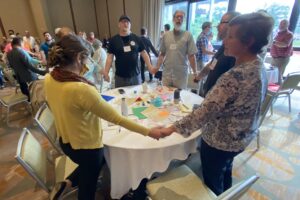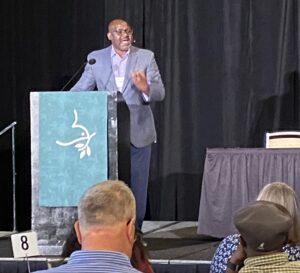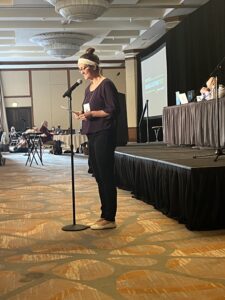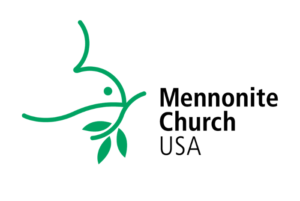 KANSAS CITY, Missouri (Mennonite Church USA)— Delegates at Mennonite Church USA’s (MC USA) Special Session of the Delegate Assembly, May 27-30, passed three resolutions that help to remove barriers for LGBTQ people and those with disabilities and adopted a fourth resolution, “For Justice in the Criminal Legal System,” for denominational study.
KANSAS CITY, Missouri (Mennonite Church USA)— Delegates at Mennonite Church USA’s (MC USA) Special Session of the Delegate Assembly, May 27-30, passed three resolutions that help to remove barriers for LGBTQ people and those with disabilities and adopted a fourth resolution, “For Justice in the Criminal Legal System,” for denominational study.
Support for the resolutions varied. Delegates unanimously approved the “MC USA Accessibility Resolution,” which calls the church to “recognize and seek to remove the barriers to belonging … that prevent individuals with disabilities from participating in church life.”
“A Resolution for Repentance and Transformation,” which calls the church to repent for harm done to LGBTQ people and calls for broader inclusion of LGBTQ people, passed with a thinner majority at 55.7% (267 yes, 212 no, 9 abstentions).
Both are “church statement resolutions” which are not binding on congregations or conferences, but provide an opportunity for discernment, education and advocacy, while still acknowledging dissenting voices, according to the denomination’s Guidelines for Developing Resolutions.
Clarification on Mennonite Church USA Polity and the Role of the Membership Guidelines of Mennonite Church USA,” an “organizational resolution” that directly impacts church polity, was approved by 82.8%* of the delegates (404 yes, 84 no, 3 abstentions). This resolution retires the denomination’s Membership Guidelines, which, among other things, prohibits pastors from performing same-sex covenant ceremonies. It also calls the church to “commit to the difficult work of being church together amidst our differences, working at biblical justice and reconciliation where there is conflict.”
“This weekend, we did the demanding work of struggling together as the body of Christ,” said MC USA Executive Director Glen Guyton. “We will continue to live into our Renewed Commitments of following Jesus, witnessing to God’s peace and helping those we encounter to experience the transforming power of the Holy Spirit.”
Discussion about “Clarification on Mennonite Church USA Polity and the Role of the Membership Guidelines of Mennonite Church USA”

Dr. Samuel Sarpiya
Worship speaker Dr. Samuel Sarpiya opened the Delegate Assembly on Saturday morning with an exhortation to “respond to the nudging of the Holy Spirt [and] draw the circle wider,” a reference to hymn #802 “Draw the Circle Wider” in the denomination’s Voices Together hymnal.
Delegates then began their work by engaging in a facilitated discussion around the“Clarification on Mennonite Church USA Polity and the Role of the Membership Guidelines of Mennonite Church USA.” The discussion was led by Sidney Morgan, nationally recognized facilitator and of founder Red Sea Road Consulting, LLC, and Matt Tibbles, an organizational development and conflict transformation professional and instructor at Eastern Mennonite University.
“The thing I wrestle with is that this … is not just about polity,” said Ken Burkholder, lead pastor and delegate from Souderton (Pennsylvania) Mennonite Church, during the open mic discussion. “By removing this statement, we are making a statement [with] biblical theological implications [about] our understanding of marriage [and] God’s vision of marriage, according to biblical witness,” he added. It should be noted that denomination’s faith statements are summarized in the Confession of Faith in a Mennonite Perspective and are not impacted by the resolutions passed during the Delegate Assembly.
Others said they experienced harm from the Membership Guidelines. David Edminster, St. Paul (Minnesota) Mennonite Fellowship, said, “[Our church] became one of the first churches to make a public proclamation of our welcoming status, and the consequences were severe. We lost our funding. We lost our place in our conference. We had to lay off our pastor … the Membership Guidelines hurt individuals very badly. And they hurt churches. By extension, they hurt pastors and administrators and put us in impossible situations.”
The passage of this resolution aligns MC USA practice and polity. Pastoral accountability remains a function of the area conference, and conferences have broad latitude in determining membership and credentialing, as detailed in the MC USA bylaws.
For more information on the impact of this resolution, read the MC USA staff impact statement, watch the recorded webinar and read “Dispelling myths related to the Membership Guidelines of Mennonite Church USA” by Glen Guyton.
Discussion about “A Resolution for Repentance and Transformation”
On day two of the Delegate Assembly, 72.6% of the delegates voted “yes” (357 “yes,” 135 “no,” 5 abstained) to add processing “A Resolution on Repentance and Transformation” to the agenda.
The resolution acknowledges the harm caused by MC USA’s Membership Guidelines in excluding LGBTQ people and calls for the denomination to “rescind” Section III of the Membership Guidelines, create an LGBTQ constituency group, provide resources to encourage truth-telling and “embody a theology that honors LGBTQ people and relationships with all future MC USA theological statements.” The Inclusive Mennonite Pastors wrote the resolution, and it was endorsed by 31 organizations, including 26 Mennonite congregations and almost 500 individuals.
During the open mic discussion, Curt Stutzman, Weavers Mennonite Church, Harrisonburg, Virginia, said, “…I hold a deep conviction that my desires are to be submitted to God’s desires, and that God’s purpose and place for sexual expression is within marriage between a man and a woman. In order to be faithful to God and loving to those around me, [I] must ask others to submit their desires to God’s authority. This conviction results in my sometimes being viewed as intolerant and unjust. If you … believe that I’m intolerant, it will not change the fact that I love you [and] I believe … that God loves you so incredibly. Jesus is the way the truth and the life, and He desires us all, wishing that none should perish. None. I must be faithful to His leading.”
Chris Barghout, of Portland (Oregon) Mennonite Church, read a message from the Inclusive Mennonite Pastors that said, “This resolution is not punitive. It does not punish pastors, members or congregations who refuse full participation of queer people in their churches. This resolution does not call for the revising of the Confession of Faith [in a Mennonite Perspective]. This resolution will not change MC USA policy. Conferences and congregations will still determine who they call, confirm and ordain. This resolution does not require pastors to officiate same-sex weddings or force congregations to accept or baptize queer people.” He also expressed appreciation for Portland Mennonite Church, where he and his husband are able to live into their faith.

Amy Zimbelman, conference minister of Mountain States Mennonite Conference
Amy Zimbelman, conference minister of Mountain States Mennonite Conference, a diverse conference that also was the first to ordain an openly gay pastor, said, “When I study the Bible, I see a Jesus who hung out with all types of folks. It did not taint Jesus’ relationship with God’s Spirit to have a drink with diverse people — in fact, it was a sign of the coming kingdom of heaven that the marginalized were brought to the center … Let’s keep eating and drinking and learning together … with our marginalized LGBTQIA siblings.”
For more information on the impact of this resolution, read the MC USA staff impact statement and watch the Facebook Liverecording from May 29.
Discussion about the “Mennonite Church USA Accessibility Resolution”
Written by a collaborative team from MHS, an agency of MC USA, and Anabaptist Disabilities Network (ADN), a ministry partner, this church statement resolution calls congregations to evaluate and increase their accessibility to people with disabilities, while offering resources — including grants — tools and support through ADN.
Lauren Thompson, a youth delegate representing North Baltimore (Maryland) Church, shared that she has a medical condition that requires her to put her feet up while sitting for longer periods of time. “A lot of churches have pews that are spaced very close together, making it hard to do that. I wanted to highlight that as something to think about,” she said. She also encouraged delegates to talk to their youth members, saying, “We have a lot of ideas, even though we’re younger.”
MaryBeth Moore, a mother of two deaf children and a delegate for Virginia Mennonite Conference, said, “By excluding people with disabilities, we are excluding gifts. God gives each of us gifts. If our churches are not accessible to everyone, it’s the whole community that’s missing out.”
For more information on what this church statement means, see the MC USA staff impact statement and watch the recorded webinar. For more resources on accessibility, visit MC USA’s “Learn, Pray, Join: Welcoming EveryBODY” initiative webpage.
 Discussion about “For Justice in the U.S. Criminal Legal System”
Discussion about “For Justice in the U.S. Criminal Legal System”
Delegates also discussed “For Justice in the U.S. Criminal Legal System,” which the Resolutions Committee designated as a study resolution. Written by Zachariah Begly of Reba Place Church , Evanston, Illinois, and Eli Reimer of Lombard (Illinois) Mennonite Church, the resolution calls for congregations to support 10 suggested commitments, including learning about the injustices in the U.S. criminal legal system, speaking with and learning from former prisoners, supporting the families of the incarcerated, learning how the legal system has been shaped by racist assumptions, and advocating for a broad list of reforms, such as ending cash bail and mandatory minimum sentencing.
MC USA encourages congregations to engage with this resolution during the next year.
For more information on what this resolution means, see the MC USA staff impact statement and watch the prerecorded webinar.
The Delegate Assembly is the most representative decision-making body in MC USA. The Executive Board scheduled the special session to complete the work of the 2019-2021 biennium and to allow in-person discernment on proposed resolutions.
Read the Spanish version here.
Mennonite Church USA is the largest Mennonite denomination in the United States, with 16 conferences, approximately 530 congregations and 62,000 members. An Anabaptist Christian denomination, MC USA is part of Mennonite World Conference, a global faith family that includes churches in 58 countries. MC USA has offices in Elkhart, Indiana, and Newton, Kansas. mennoniteUSA.org
*Percentages are based on total yes/no votes and do not include votes to “abstain.”

